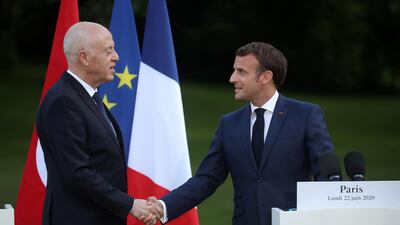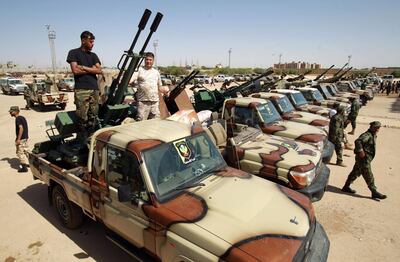French President Emmanuel Macron has held talks with foreign and regional leaders over escalating tensions in Libya, calling Turkey’s intervention in the country unacceptable.
Speaking in Paris with his Tunisian counterpart, Kais Saied, Mr Macron told reporters Turkey was playing a “dangerous game” in Libya and was “in breach of all its commitments” to the North African country.
Ankara has turned the tide of Libya’s internecine civil war in recent weeks by providing air support and thousands of mercenary fighters to end a year-long offensive by the Libyan National Army (LNA) commander, Field Marshal Khalifa Haftar, on the capital, Tripoli.
Mr Macron accused Ankara of disregarding Libya’s arms embargo, to which it recommitted in January at the Berlin conference on Libya with other world powers, to produce the major shift on the ground.
On Tuesday, Turkey's foreign ministry fired back, accusing France of backing Mr Haftar’s LNA forces. Paris has insisted on its neutrality in Libya.

The series of quick victories by forces aligned with the Government of National Accord (GNA) in Tripoli, which are also bolstered by Turkish armoured vehicles and advisers, has drawn other international and regional players into Libya’s long-standing proxy war with renewed vigour.
Mr Macron also spoke with US President Donald Trump over the phone to discuss the escalating situation in Libya. According to the French press, the French president focused predominately on Turkey’s role in the conflict during the call.
Tensions between France and Turkey reached a new nadir last week as Paris denounced as "extremely aggressive" an early intervention by Turkish ships against a French navy vessel enforcing the arms embargo on Libya. Ankara dismissed the claims as "groundless".
The Turkey-backed counter-offensive in western Libya has forced US re-engagement in the country as Washington has accused Moscow of escalating its involvement. On Monday the US ambassador to Libya, Richard Norland, met GNA head Fayez Al Sarraj in Zuwara near Libya’s western border.
In a statement after the meeting, the Mr Norland warned that the current wave of violence in Libya risked allowing a resurgence of ISIS. The terror group established franchises in the coastal town of Sirte and in the eastern town of Derna after the outbreak of Libya’s 2014 civil war.
While it was ultimately expunged from those northern areas, the group has maintained a presence in Libya’s vast desert south, where it has launched sporadic attacks on oil infrastructure.
As the GNA’s forces prepare for an assault on Sirte and the resource-rich oil crescent beyond, Egyptian President Abdel Fattah El Sisi has said an attack would cross a “red line” and trigger a military intervention from Cairo.
Mr Macron backed Egypt’s warning to Turkey calling Mr Sisi’s concerns “legitimate”.
"I don't want in six months, or one year or two, to see that Libya is in the situation that Syria is in today," Mr Macron said.
In a report by the Carnegie Middle East Centre, senior fellow Yezid Sayigh has said an intervention by Egypt in Libya is looking increasingly likely although Cairo is considering such a move only as a last resort.
“If worse comes to worst, Egypt has the ability to move a significant number of forces into Libya since it is right next door to the country. In this regard, its capacities are greater than Turkey’s,” he wrote, explaining Cairo’s forces would likely remain in the east, securing the LNA’s rear and freeing up troops to redeploy.
“There will probably also be a certain amount of international sympathy and even open support for Egypt from Russia and some European countries. The United States and main European countries would probably express their understanding for such a move, but not voice unconditional support,” Mr Sayigh added.
In June, Egypt unveiled a road map for the peace talks that was backed by the UAE and other Gulf states and welcomed by European nations and the US. Turkey and the GNA rejected the initiative.
On Monday, the UN’s International Follow-up Committee on Libya, co-chaired by the Arab League, welcomed ongoing 5 + 5 talks, which have sought to build on the Berlin conference at the start of this year.
The committee reiterated its concerns over human rights violations in Libya, the flouting of the country’s weapons embargo and called for the withdrawal of all foreign mercenaries and foreign military forces.
According to figures from the United Nation’s refugee agency, migrant arrivals to Italy in the past two weeks, the vast majority of whom come from Libya over the Mediterranean, have almost doubled compared with the same period last year.
Across January, February, April and May the numbers in 2020 were up on 2019, with almost one quarter of the arrivals in Italy being children.
For European nations such as Italy and Malta, security in Libya has become a key domestic concern because of the impact illegal migration has had on national politics.



